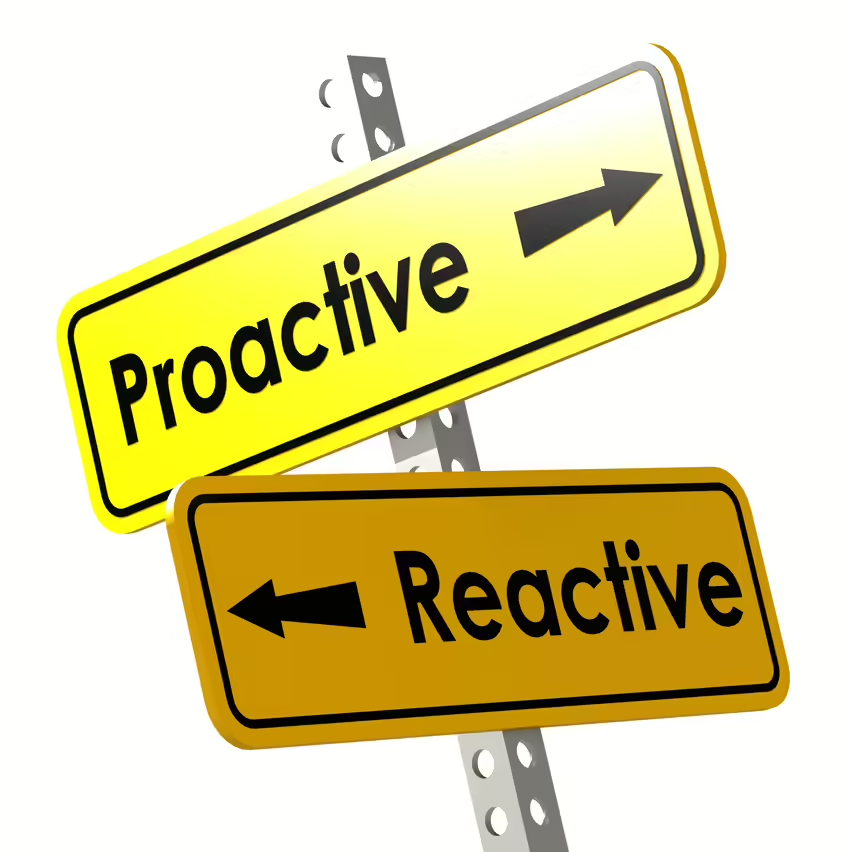When it comes to your human resources strategy, think of it as being at a crossroads.
You can take the proactive path, where HR gets out in front, spots problems and opportunities from a mile away, and comes up with plans to tackle them before they snowball.
Or, there’s the reactive route, where HR is more like a firefighter, dealing with issues only when they flare up, which can sometimes lead to rushed and less-than-ideal decisions. Your choice really shapes how your organization rolls into the future.
Here, we compare proactive versus reactive HR strategies to determine which approach is best to facilitate workforce development.
The Difference Between Proactive and Reactive HR
Proactive and reactive HR are two different game plans. With proactive HR, you’re always one step ahead, predicting what your team might need in terms of staff and training.
On the flip side, reactive HR is more about playing catch-up, dealing with matters as they come without much future planning. Often, smaller businesses lean toward this reactive way, while the larger ones are planning their next moves in advance.
But here’s the thing—even smaller businesses can start playing the long game by adopting a proactive approach.
Four Critical Areas of Strategic Management in HR
There are four critical areas impacted by your HR strategy:
1. Recruitment
Proactive recruitment strategies anticipate staffing needs and take steps to facilitate effectiveness in hiring. This might include maintaining a current pool of applications and conducting rolling interviews to spot hiring opportunities to grow your talent pool. You can’t maintain a flow of skilled employees with a reactive HR strategy.
Although you might be adept at meeting needs as job openings arise, you miss out on the benefits of reviewing and maintaining applicants who are interested in your company. You also end up incurring more costs to run ads and restart the interview process for every job opening.
2. Productivity
In a proactive HR environment, there’s a significant focus on boosting productivity by anticipating and addressing potential roadblocks before they impact workflow. Again, planning ahead matters.
Proactive strategies might include regular skills training, investing in employee wellness programs, or implementing efficient resource management. This avenue not only keeps the workforce engaged but also ensures that they have the necessary tools and motivation to maintain high productivity levels.
In contrast, reactive HR often deals with productivity issues only after they have caused a significant impact, leading to potential delays and decreased efficiency.
3. Culture
Company culture is mission-critical.
Proactive HR contributes to a positive, forward-thinking culture by actively shaping policies and practices that promote inclusivity, employee satisfaction, and engagement. This could involve regular feedback sessions, team-building activities, and recognizing employee achievements.
On the other hand, a reactive HR approach might struggle to build a strong culture, as it’s often caught off-guard by emerging issues, leading to a workplace environment that can feel unstructured and inconsistent.
4. Business Results
A proactive HR strategy really ties your human resources efforts to your business’s big-picture goals.
It’s a game-changer in retaining top-notch talent, slicing turnover costs, and boosting your reputation as an employer. Proactivity fosters a workforce that’s flexible and robust, ready to help your business grow steadily and withstand challenges.
Reactive HR might lead to missed opportunities and a team that’s not quite in sync with your long-term objectives, which can put a damper on your business’s ability to thrive and stay agile in a competitive market.
The choice between proactive and reactive HR strategies hinges on your business’s scale, resources, and objectives. It’s important to note that it’s not black and white. For larger companies a proactive approach is often the better fit, but smaller ones can benefit from combining both, addressing immediate needs while progressively planning for the future.
About Focus HR, Inc.
Focus HR, Inc. uncomplicates the people side of business by providing small business owners with outsourced HR, project HR, and Leadership Coaching. For more information, please contact us today! If you liked this post, please subscribe to our blog. You can opt out at any time.
To learn more about FocusHR and for updates, please like our Facebook page and follow us on LinkedIn.

